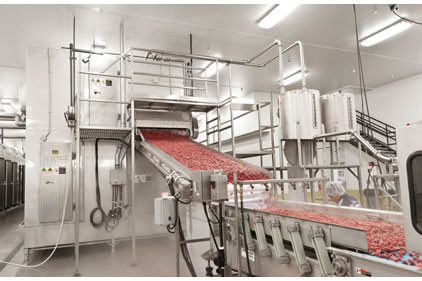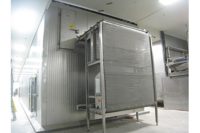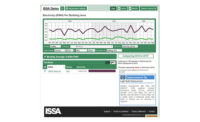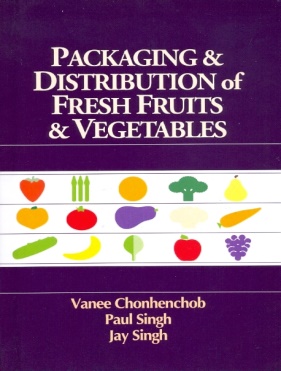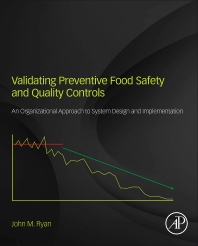Enfield Farms, a Lynden, Wash.-based family-owned and operated business for more than 30 years, produces high-quality blueberries and raspberries, maintaining complete control over every aspect of its berry production from start to finish, from the propagation and growth of each plant all the way through to the final stages of harvesting and processing.
maintaining complete control over every aspect of its berry production from start to finish, from the propagation and growth of each plant all the way through to the final stages of harvesting and processing.
Challenges preserving raspberries
Product quality is critical to raspberry processors, who have long faced challenges in maintaining the delicate attributes of the berry during the preservation process. The raspberry’s hollow shape makes it susceptible to crushing, which can turn the berry into a jam-like substance. To maintain the berry’s shape, liquid nitrogen crusting freezers have been used in front of the traditional individually-quick frozen (IQF) raspberry freezer as one of the few viable methods of conditioning the berries before deep freezing. However, the high costs associated with the use of liquid nitrogen leaves fruit processors to seek out a less expensive solution while still maintaining the quality of their frozen berry products. Such was the case for Enfield Farms in relation to their frozen raspberry products.
“We take pride in using the most progressive farming techniques and latest technology in processing to produce exceptional fruit for our customers,” says Andy Enfield, president of Enfield Farms. “We did not have a way to preserve our raspberries that would ensure the quality of the product without liquid nitrogen. However, using liquid nitrogen can get very expensive, as we were using about 2-3 tanker loads per day with our old tunnel. We wanted to eliminate the use of liquid nitrogen and find a way to maintain the high quality of our product without the huge expense.”
Another challenge in maintaining adequate product quality is broken pieces of fruit clumping the raspberries during the freezing process. These can occur through uneven temperature distribution during the freezing process.
A cost-effective alternative to liquid nitrogen and cryogenic crusting processes
After hearing from customers about their challenges in freezing raspberries in a cost-effective manner, GEA Refrigeration Canada, formerly GEA Aerofreeze Systems, responded to the market‘s need for an improved yet lower operating cost method of freezing raspberries without the use of liquid nitrogen. The company‘s new IQF Tunnel Freezer (Aerofreeze), referred to as the AY series, eliminates the need for liquid nitrogen or other cryogenic crusting processes. The tunnel’s fully-welded, enclosed design helps provide a powerful and yet gentle airflow together with specially designed belt conveying system to evenly freeze the berries to the highest Individual frozen quality. The freezer ensures product quality through a combination of an even air distribution and higher air pressure than conventional belt freezers and mechanical belt agitators. The result is ideal freezing conditions while maintaining product quality with reduced clumping and breakage. In addition, the freezer operates at an economical operation at a suction temperature of -31°F, which offers energy savings for the processor compared to -40°F, which is often required by other freezer suppliers.
As a result, Enfield Farms is realizing reduced operational costs, as they no longer need to use liquid nitrogen or other cryogenic crusting processes.
“We are now able to freeze our raspberries without the use of liquid nitrogen,” says Enfield. “This new tunnel really does an exceptional job of freezing. We are very impressed with the freezer, and the ability to be able to freeze without the liquid nitrogen is a huge benefit to our operations.”
IQF tunnel freezer improves product quality
Product quality also has improved with the implementation of the new IQF tunnel, as Enfield says they have seen a huge reduction in the number of clumped and broken pieces.
To be sure, Enfield performs a variety of tests, including picking berries off the discharge and squeezing them. If the berries separate into individually frozen raspberry seeds, it is around the right temperature. The core of the actual fruit is inspected for freeze consistency from product across the belt. It is important that the IQF is producing consistent fruit temperature across the entire width of the belt as once the fruit is packed, any temperature difference can affect the final product. Quality inspectors will randomly collect small buckets of berries and inspect them for damage, freeze quality and give it a letter grade rating, of which Enfield earns the USDA’s A-grade rating. By definition, to qualify for the USDA’s A-grade rating, the quality of frozen raspberries possess similar varietal characteristics, such as a bright, practically uniform typical color; are practically free from defects; maintain good character, normal flavor and odor; and score no less than 85 points in accordance with the scoring system. Enfield’s products exceed these standards.
“There is no other freezer currently available that can handle this type of product and deliver the required product quality,” says Robert Laflamme, president, GEA Refrigeration Canada, Inc. “We’ve been working over the past several years to develop a freezer that meets the unique needs of this market, and are pleased that Enfield Farms is realizing benefits.”
